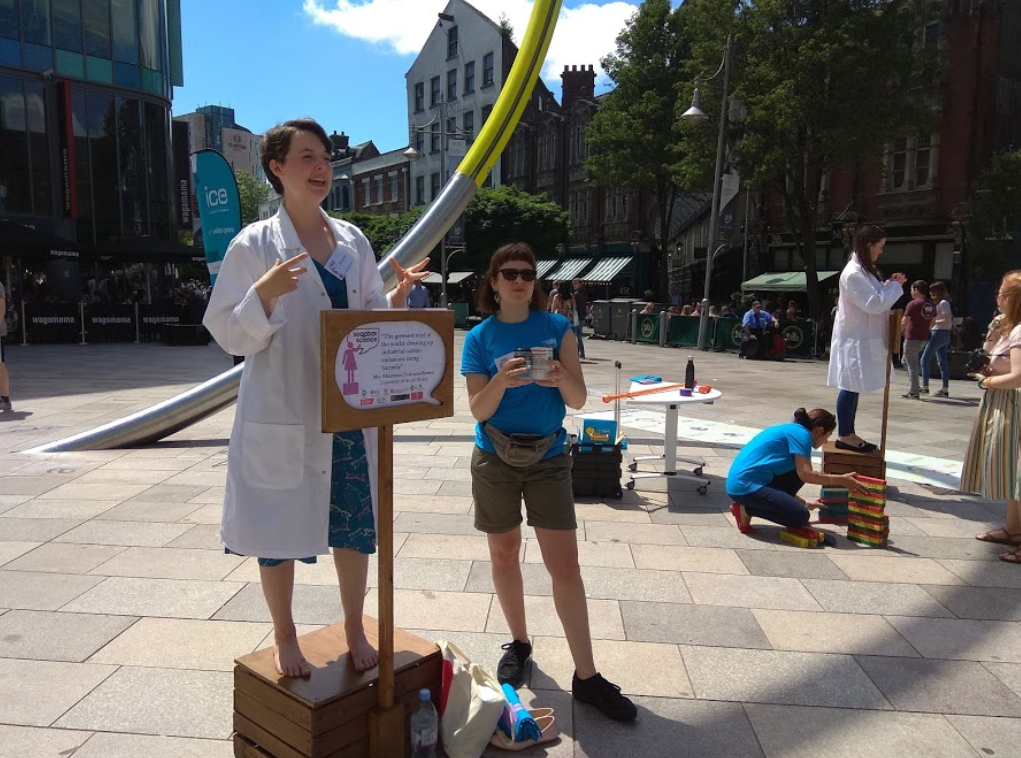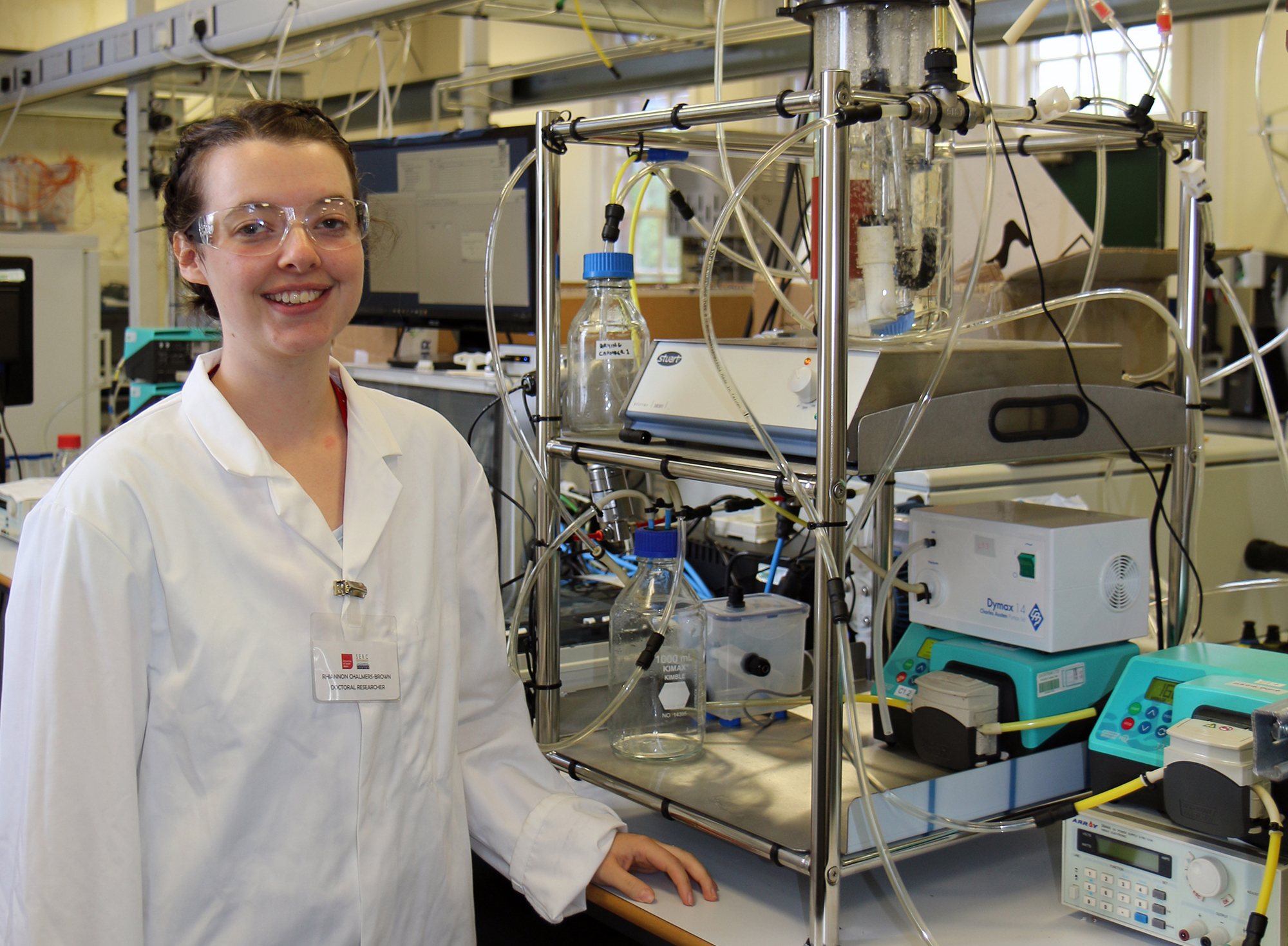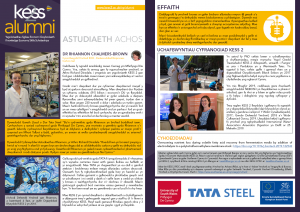
DR RHIANNON CHALMERS-BROWN :
Cynorthwyydd Ymchwil RICE – Dadansoddiad Bioprocess Carbon Isel
Cwblheais fy ngradd israddedig mewn Cemeg ym Mhrifysgol De Cymru. Yna, cefais fy annog gan fy ngoruchwyliwr ymchwil, yr Athro Richard Dinsdale, i ymgeisio am ysgoloriaeth KESS 2 gan fod gen i ddiddordeb mawr mewn ynni adnewyddadwy a’r sector amgylcheddol yn gyffredinol.
Credir mai’r diwydiant dur yw cyfrannwr diwydiannol mwyaf y byd at garbon deuocsid atmosfferig. Mae diwydiant dur Prydain yn cyfrannu oddeutu £9.5 biliwn i economi’r DU yn flynyddol. Mae dur yn ddeunydd allweddol ar gyfer adeiladu a darparu ffynonellau ynni adnewyddadwy fel pwer gwynt, trydan dwr a solar. Mae angen 230 tunnell o ddur i adeiladu un tyrbin gwynt. Mae’n hanfodol bod y broses gweithgynhyrchu dur yn newid i fod yn un mwy cyfeillgar i’r amgylchedd ond yn parhau i fod yn gost-effeithiol ac effeithlon fel bod cynhyrchu dur yn gynaliadwy wrth i ni wynebu’r tro anochel at dechnoleg a menter werdd.
Y BARN O DIWYDIANT AC ACADEMIA
Dywedodd Gareth Lloyd o Dur Tata Steel “Bu’n cyd-weithio gyda Rhiannon yn brofiad boddhaol iawn. Cynhyrchom y syniad cychwynnol gyda Phrifysgol De Cymru, yna recriwtio a gweithio gyda Rhiannon o’r gwaith labordy cychwynnol llwyddiannus hyd at ddylunio a defnyddio’r cyfarpar peilota er mwyn profi’r cysyniad ym Mhort Talbot a fydd, gobeithio, yn arwain at wella cynaliadwyedd amgylcheddol ac ariannol gweithgynhyrchu dur yng Nghymru.”
Dywedodd Cyfarwyddwr Astudiaethau Rhiannon, yr Athro Richard Dinsdale “Roedd hwn yn brosiect pwysig a heriol sy’n mynd i’r afael â’r angen brys am dechnolegau dal ac ailddefnyddio carbon y gellir eu defnyddio nid yn unig yng Nghymru ond yn fyd-eang. Gweithiodd Rhiannon yn galed mewn cydweithrediad a’i phartneriaid diwydiannol i nodi datryson posib. Rydym nawr yn ceisio eu gweithredu yn Ne Cymru.”

Galluogodd cyd-weithio gyda TATA fi i ymgyfarwyddo â’r rhwystrau sy’n wynebu cwmnïau mawr wrth geisio lleihau eu heffaith ar yr amgylchedd. Mae TATA yn rhagweithiol yn eu dull o ganfod atebion i broblemau enfawr megis allyriadau carbon deuocsid. Gwnaeth hyn fy nghydweithrediad gyda hwy yn hawdd ac yn ddymunol. Cefais gymaint o gyfleoedd a phrofiadau gwych ond yr uchafbwynt i mi oedd y daith o’r safle lawn a oedd yn olrhain y broses o weithgynhyrchu dur o’r dechrau i’r diwedd. Mae’n galonogol gwybod bod cwmnïau eisiau gwneud y newidiadau hyn. Yr her fawr nesaf yw eu gweithredu cyn ei bod hi’n rhy hwyr.
Mae KESS 2 yn cynnal diwylliant o ddealltwriaeth a chyfeillgarwch a ddangosir trwy’r gefnogaeth ragorol gan y staff tu ôl i’r llenni a chyd-fyfyrwyr KESS. Rwyf wedi gwneud ffrindiau gwych dros y 3 blynedd ac edrychaf ymlaen at eu gwylio i gyd yn llwyddo.
EFFAITH
Datblygodd fy ymchwil broses ar gyfer bioburo allyriadau nwyon tŷ gwydr a’u trosi’n gemegau i’w defnyddio mewn biobolymerau a phlastigion. Dywedir mai newid hinsawdd yw un o brif ysgogyddion marwolaethau rhywogaethau ledled y byd, gan arwain at golli bioamrywiaeth a chwymp ecosystemau sefydlog. Mae hyn yn effeithio’n uniongyrchol ar fodau dynol, gan fygwth ein hadnoddau bwyd, dwr glan ac aer.
Mae’r bioadweithydd bellach yn cael ei beilota ac mae posibilrwydd y gellir ei ddatblygu yn dechnoleg fforddiadwy er mwyn pontio’r diwydiant dur fel y mae â dyfodol cynaliadwy drwy weithgynhyrchu dur gwyrdd.
UCHAFBWYNTIAU CYFRANOGIAD KESS 2
Yn ystod fy PhD cefais lawer o uchafbwyntiau a chyflawniadau, megis mynychu Ysgol Gradd Trawswladol KESS 2 ddwywaith, unwaith i Fangor ac yna i Pardubice yn y Weriniaeth Tsiec. Yn ogystal â hyn, cefais gyfle i gymryd rhan yn y digwyddiad Gwyddoniaeth Blwch Sebon yn 2017 yng Nghaerdydd a hefyd mynychu cwrs ysgrifennu a chyfathrebu yng nghanol Cymru.
Ym mis Rhagfyr 2019, cwblheais gwrs rheolaeth amgylcheddol NEBOSH yn llwyddiannus a phasio’r arholiad, gan fy rhoi ar y blaen ar gyfer rolau posib a fy helpu i ddisgleirio yng ngolwg cyflogwyr y dyfodol.
Trwy raglen KESS 2 llwyddais i gyflwyno fy ngwaith yn y digwyddiad blynyddol dair blynedd yn olynol ac enillais y gwobrau canlynol: Y Wobr Cynaliadwyedd, 2017; Gwobr Delwedd Ymchwil, 2018 a’r Wobr Cyflwyniad Gorau, 2019. Llwyddais hefyd i gyflwyno fy ymchwil yng nghynhadledd International Water Association Anaerobic Digestion yn Delft ar 25 Mehefin 2019.

CYHOEDDIADAU
Overcoming nutrient loss during volatile fatty acid recovery from fermentation media by addition of electrodialysis to a polytetrafluoroethylene membrane stack : https://doi.org/10.1016/j.biortech.2019.122543
Menter sgiliau lefel uwch Cymru gyfan sy’n cael ei harwain gan Brifysgol Bangor ar ran y sector AU yng Nghymru yw Ysgoloriaethau Sgiliau’r Economi Wybodaeth (KESS 2). Mae’n cael ei hariannu’n rhannol gan raglen gydgyfeirio Cronfa Gymdeithasol Ewrop (ESF) Llywodraeth Cymru ar gyfer Gorllewin Cymru a’r Cymoedd. Am ragor o wybodaeth am sut y gallai eich sefydliad elwa o gymryd rhan yn KESS 2, cysylltwch â thîm canolog KESS 2 ym Mangor ar: kess2@bangor.ac.uk neu dîm KESS 2 PDC ar: kess@southwales.ac.uk
Mae tîm KESS 2 PDC wedi’i leoli yng Ngwasanaethau Ymchwil ac Arloesi (RISe), sy’n rhan o’r Adran Ymchwil ac Ymgysylltu â Busnes. Mae RISe yn dîm ymroddedig sy’n darparu cymorth arbenigol ar gyfer Seilwaith Ymchwil; Cymorth Ymchwil Ôl-raddedig; Effaith Ymchwil; a Chynhyrchu Incwm. Ewch i: https://www.southwales.ac.uk/cymraeg/ymchwil/










